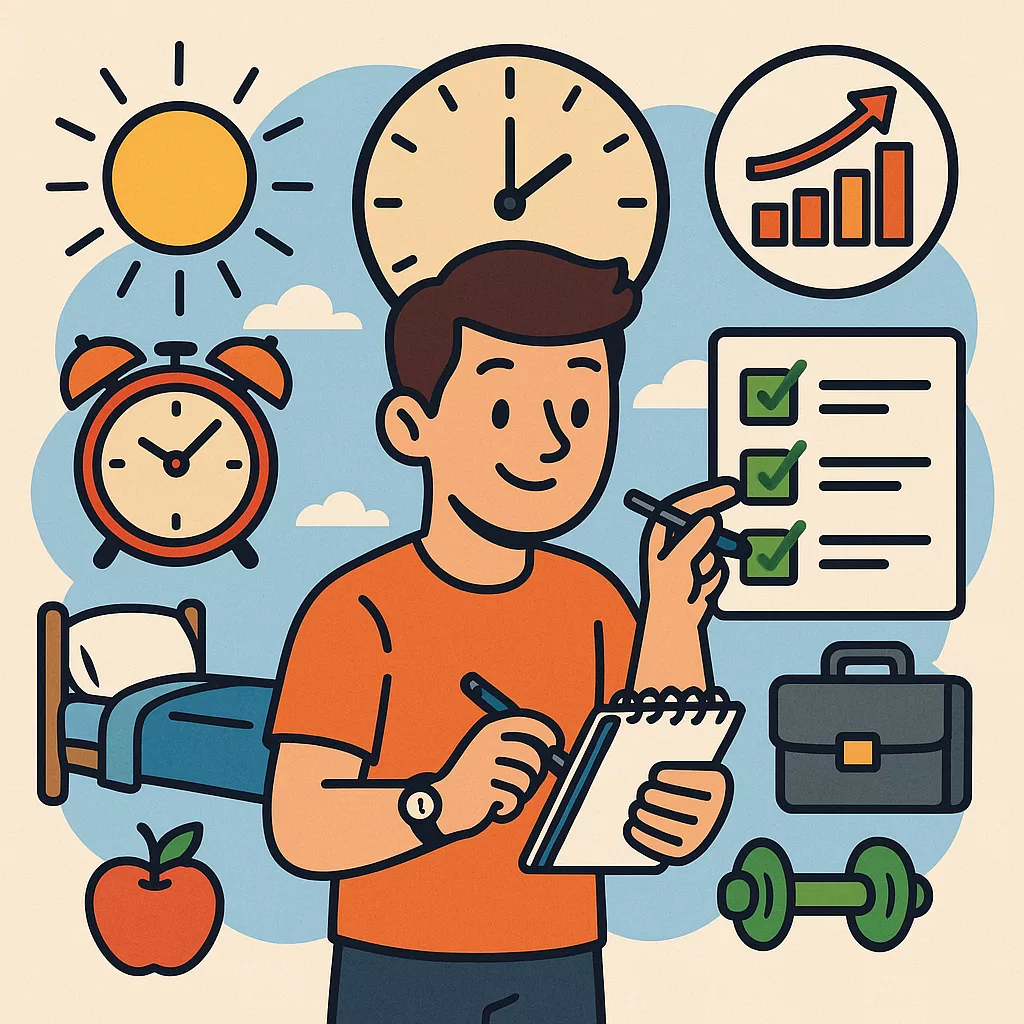Let’s be real—routines sound as thrilling as watching paint dry. But imagine them as a secret weapon, quietly making you sharper, calmer, and way more productive. Whether you’re writing killer blog articles, managing SEO strategy, or getting your spiritual groove on, a solid routine is a foundation, not a prison.

1. Routines Reduce Mental Clutter (and Burnout)
- Brain-saving mode: Research shows routines help decrease decision fatigue—your brain’s way of saying “enough choices, please.” That frees up mental energy for higher-level thinking.
- Predictability is peace: Knowing the next step makes your mind less jumpy and more focused, lowering stress levels.
- Routine anchors your day: According to occupational therapy research, structured routines preserve cognitive bandwidth and boost creativity.
2. Trending Routine Techniques: Time-Blocking, Batching & Shukan
a) Time-Blocking: Schedule That Hustle
Time‑blocking is the art of dividing your day into dedicated chunks for specific tasks—like dedicating 9–11 AM for high-focus writing, then lunch, then… well, lunch procrastination. This prevents distraction hijacking.
Quick stat: People who time-block get around 53% more tasks done. Cal Newport, author of Deep Work, swears by it.
b) Batching: Herding Tasks by Type
Instead of jumping between email, social media, and household chores, do similar tasks in one go. This keeps your focus bank from draining. A recent Washington Post piece praises batching for beating brain fog and boosting efficiency.
c) Shukan: The Japanese Habit Philosophy
Building routine isn’t just about tasks—it can be a mindset. The concept of Shukan emphasizes slow, steady, and meaningful routine crafting, instead of short-lived motivation bursts. Rooted in discipline and resilience, it’s perfect for long-term wins.
3. Health & Well-Being Perks of Routine
a) Better Sleep & Less Anxiety
Having a consistent schedule—especially around sleep—combat stress, anxiety, and even insomnia.
Morning routines, especially, help set a positive tone—hydrating, stretching, planning, or journaling—all play a part.
b) Boost Brain Health & Mood Through Movement
Even short bursts of aerobic activity improve executive function, decision-making, and sleep quality.
Also, regular exercise boosts mood, mental resilience, and brain clarity—without needing a gym membership.
c) Power Your Day with Nap Sprints
Naps are getting a cool glow-up. A study in Time highlights that 20–40 minute naps between 1 and 4 p.m. help with memory, focus, and creativity—plus they’re stress relief in a snooze.
4. Routine’s Role in Workplace Flow & Wellness
a) Four-Day Week — New Routine, Big Results
The latest six-month global trial of a four-day workweek (without pay cuts) shows lower burnout, better health, and steady productivity.
Australia’s labor union is pushing for the “100:80:100” model (same pay for fewer hours) to improve well-being and work-life balance.
b) Booster Breaks: Mini Rituals with Mega Impact
Routine isn’t all big blocks—it’s also tiny resets. “Booster breaks”—10–15 minute structured pauses for movement, breathing, or stretching—not only recharge the brain but boost productivity and mood.
c) Hybrid Work + Routine = Happy Life
Working from home part-time (as part of a hybrid model) gives flexibility to build routines that support sleep, meals, exercise, and reduce burnout.
5. How Long Until Your Routine Sticks?
- Habit formation isn’t one-size-fits-all. Research shows it can take anywhere 18 to 254 days for a habit to stick—average is around 66.
- Slipped up one day? No biggie. Missing a day won’t break your progress.
6. Practical “Routine Hacks” That Work
Step-by-step: Build That Routine
- Start small
Pick one or two “keystone” habits—like journaling, morning stretching, or time‑blocking the first task. - Use time-blocking templates
Block key tasks, breaks, and sacred personal time into your calendar. - Batch similar tasks
Group errands, emails, or creative tasks to minimize cognitive overhead. - Add “Booster breaks”
Every hour or two, do a mini stretch, breathing pause, or mindful break. Can be as short as 10 minutes. - Respect your circadian rhythm
Hook activities to your natural energy peaks. Morning for deep focus, afternoon for naps or light tasks. - Incorporate cultural ritual—like Shukan
Treat routine as a habitual philosophy, not a to-do list. Steady, not flashy. - Track progress, not perfection
Use simple tracking (journal, app) and celebrate mini-wins—even meditation for five minutes counts. - Plan the evening wind-down
Routine starts the night before—set a shutdown ritual: no screens, prep tomorrow’s tasks, maybe prayer or gratitude journaling.
Keep It Real: Your Routine, Your Way
Flexibility matters: Routines shouldn’t feel like a straitjacket or a relentless task marathon. They’re a gentle guide to support your goals, not a chore rodeo that leaves you drained.
Spiritual angle: Rooted in Christian values? Blend discipline, rest, and peace into your day with prayer or devotion. These moments add soul-deep meaning, turning routine into worship.
Customize for your rhythm: Your peak focus might be midnight, not morning. Build a routine that fits your energy and lifestyle—not a cookie-cutter ideal. Tweak it to feel natural, with room for life’s surprises.
In Summary
Building a routine for personal and professional success isn’t about being tied to a rigid planner—it’s about creating a framework that frees your mind, body, and spirit. Use smarter time-blocking to carve out focused time for tasks and batch similar activities, like emails or creative work, to boost efficiency. Prioritize wellness with movement, healthy eating, and power naps to recharge energy and focus. Embrace cultural practices like Shukan, the Japanese habit of weekly consistency, to build small, sustainable wins. Stay persistent, forgive slip-ups, and celebrate small victories—they add up. A good routine blends structure with flexibility, empowering you to thrive while staying true to your unique rhythm.
References
Caputo, M. (2025, March 6). Extraordinary benefits to a structured routine. The Independent. https://www.verywellmind.com/
Indeed Editorial Team. (2025, July 24). 3 examples of daily routines (with benefits and tips). Indeed Career Advice. Indeed
Psychology Today. (2021, November 7). The importance of routines in pursuit of your goals. https://www.psychologytoday.com/us/blog






